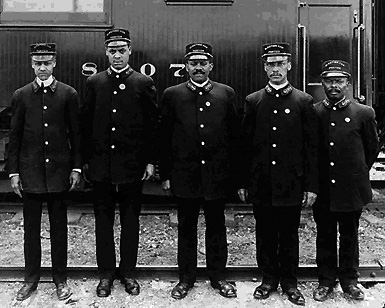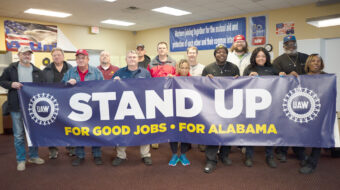
On May 8, 1925, A. Philip Randolph and Milton P. Webster founded the Brotherhood of Sleeping Car Porters. Representing the Pullman Porters, the Brotherhood was the first African-American labor union to sign a collective bargaining agreement with a major U.S. corporation.
A. Philip Randolph was the determined, dedicated, and articulate president of this union who fought to improve the working conditions and pay for the Pullman Porters.
Entrepreneur George Pullman was known as a genius for public relations and a shrewd and intrepid businessman. The first transcontinental railroad in the U.S. had been completed in 1869 after the end of the Civil War. The passenger railroad industry provided national travel for people even before the invention of the automobile and construction of the national highway system, and the advent of commercial air flight. The Pullman Palace Car Company built, owned, and operated the majority of the passenger trains during this era.
In the beginning, many workers on the passenger cars were recently freed former slaves who served as porters, waiters, chambermaids, and valets all rolled into one person
The Pullman Company hired only African-American men for the job of porter.
Passenger trains were known as “hotels on wheels” because passengers could amuse themselves with social activities and conversation in the lounge cars, eat meals in the dining cars, and rest comfortably overnight in the sleeping cars.
The A. Philip Randolph Pullman Porter Museum website describes the struggle of the Pullman porters:
“The porters had tried to organize since the beginning of the century. The wages and working conditions were below average for decades. For example, the porters were required to work 400 hours per month or 11,000 miles-whichever occurred first to receive full pay. Porters depended on the passengers’ tips in order to earn a decent level of pay.
“After many years of suffering these types of conditions, the porters united with A. Philip Randolph as their leader. Finally, having endured threats from the Pullman Company such as job loss and harassment, the BSCP forced the company to the bargaining table. On August 25, 1937, after 12 years of battle, the BSCP was recognized as the official union of the Pullman Porters.”
The A. Philip Randolph Institute is a constituency group of the AFL-CIO founded in 1965 by Randolph and Bayard Rustin, a leading civil rights and labor activist and strategist. APRI is an organization of black trade unionist to fight for racial equality and economic justice.
Ishmael Flory, veteran trade union organizer, activist in the African American freedom movement, and a longtime leader of the Communist Party in Illinois, became a Pullman porter in 1931, and was an active member of the Pullman porters’ union. He later became a railroad dining car chef and a leader of the Dining Car Employees Union.
Other railroad workers employed by Pullman were also involved in organizing drives over the years, including the American Railway Union founded by Eugene Debs.
United Steelworkers Union members at Pullman Standard in Chicago built the last of the Pullman Amtrak cars that still run on the nation’s tracks today. The late Ken Appelhans was one of the leaders in the strike to prevent the plant closure and appeared in the 1983 documentary, “The Last Pullman Car“, that tells the story of that struggle.

MOST POPULAR TODAY

Zionist organizations leading campaign to stop ceasefire resolutions in D.C. area

High Court essentially bans demonstrations, freedom of assembly in Deep South

U.S. imperialism’s ‘ironclad’ support for Israel increases fascist danger at home


UN warns that Israel is still blocking humanitarian aid to Gaza






Comments